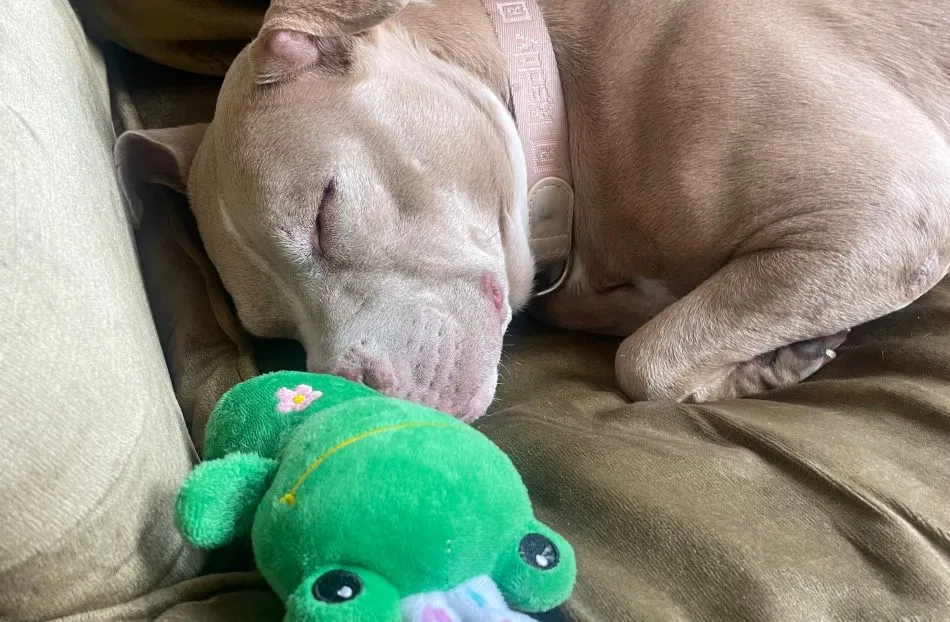Pit bulls often face a challenging public image, frequently labeled as aggressive, leading to bans in various regions. However, the breed’s inherent nature isn’t the primary issue. Instead, factors like random or irresponsible Pitbull Reproduction, coupled with poor living conditions and neglect, significantly contribute to aggressive behaviors. While these circumstances would negatively impact any dog breed, pit bulls disproportionately suffer from overbreeding and neglect. Gert Schooly, the founder of Pitty City Rescue, dedicates her efforts to saving as many of these dogs as possible, often grappling with the grim realities of uncontrolled pitbull reproduction.
The Genesis of Pitty City Rescue: A Personal Crusade Against Irresponsible Breeding
Before establishing Pitty City Rescue, Gert Schooly’s passion for pit bulls led her to rescue them independently from her early twenties. She recounted an experience in Fairmount where she encountered someone selling puppies in a park. Her immediate instinct, a practice she still maintains, was to buy these puppies to prevent them from being exploited for breeding, dogfighting, or ending up in shelters where pit bulls face the highest euthanasia rates. This personal mission, funded out of her own pocket, continued for a long time. She frequently took in dogs, sometimes housing up to ten at once, driven by an immediate connection and “love at first sight” for the breed.
The formal organization of Pitty City Rescue began when Gert met Nicole, who adopted one of her rescued pit bulls and soon became her partner in crime. Recognizing the substantial personal investment in their rescue efforts, they sought legal counsel to formalize their operations. With the pro bono assistance of lawyers who were also clients, Pitty City Rescue officially came into being, expanding its capacity to combat the consequences of rampant pitbull reproduction and neglect.
 Gert Schooly with a rescued Pitbull, highlighting the bond between humans and adopted dogs
Gert Schooly with a rescued Pitbull, highlighting the bond between humans and adopted dogs
Hotbeds of Unregulated Pitbull Reproduction: The Kensington Reality
A significant portion of the dogs rescued by Pitty City Rescue originate from areas like Kensington, Philadelphia. This unfortunate reality stems from the prevalence of backyard breeding operations in neighborhoods adjacent to animal shelters like ACCT Philadelphia and the SCPCA. These environments often facilitate unregulated pitbull reproduction, leading to an abundance of neglected animals.
Gert explains that many backyard breeders fail to recognize the sentience of these animals, viewing them purely as commodities. This transactional mindset drives them to treat dogs, especially breeding females, as “breeding machines,” providing them with minimal care, if any. The mothers are frequently found in horrific conditions, a direct consequence of irresponsible pitbull reproduction aimed solely at profit. This highlights the urgent need for intervention in how pitbull reproduction is managed at a community level.
 Before and after photos of Frank, a successful Pitty City rescue, showing the transformative power of care
Before and after photos of Frank, a successful Pitty City rescue, showing the transformative power of care
The Ongoing Battle: Awareness vs. Action in Pitbull Welfare
Despite years of tireless work, Gert doesn’t believe the situation regarding pitbull overpopulation and neglect has improved significantly. However, she notes a rise in public awareness, with more people reporting instances of backyard breeding and animal cruelty. While increased reporting is positive, substantial action and enforcement remain a challenge. The system’s capacity to address these issues is often overwhelmed.
Gert’s frustration is palpable when discussing community action. She points to city-funded shelters that desperately need more resources, yet despite protests and advocacy at city hall, systemic change is slow to materialize. She believes a shift in political mindset is necessary, suggesting that policymakers observe the conditions in shelters and distressed neighborhoods firsthand to grasp the severity of unregulated pitbull reproduction and its impact. Animal cruelty law enforcement officers, though dedicated, are stretched thin, able to do only so much in the face of widespread problems. The continuous cycle of overbreeding and neglect underscores the critical need for a more comprehensive and proactive approach to animal welfare.
 A rescue worker gently holds a Pitbull puppy, symbolizing hope amidst the challenges of rescue efforts
A rescue worker gently holds a Pitbull puppy, symbolizing hope amidst the challenges of rescue efforts
Conclusion: Advocating for Responsible Pitbull Reproduction and Community Support
The challenges surrounding pitbull reproduction, particularly the detrimental effects of backyard breeding and neglect, demand urgent attention. The dedicated efforts of organizations like Pitty City Rescue provide a crucial lifeline for countless pit bulls, yet they cannot solve the problem alone. True progress requires a multi-faceted approach involving increased public awareness, stronger political will, enhanced funding for shelters, and robust enforcement against cruelty. By understanding the profound impact of irresponsible pitbull reproduction and supporting rescues, communities can work towards a future where every pit bull receives the care and respect they deserve. Take action by reporting suspected backyard breeding, supporting local shelters, or considering adoption.
